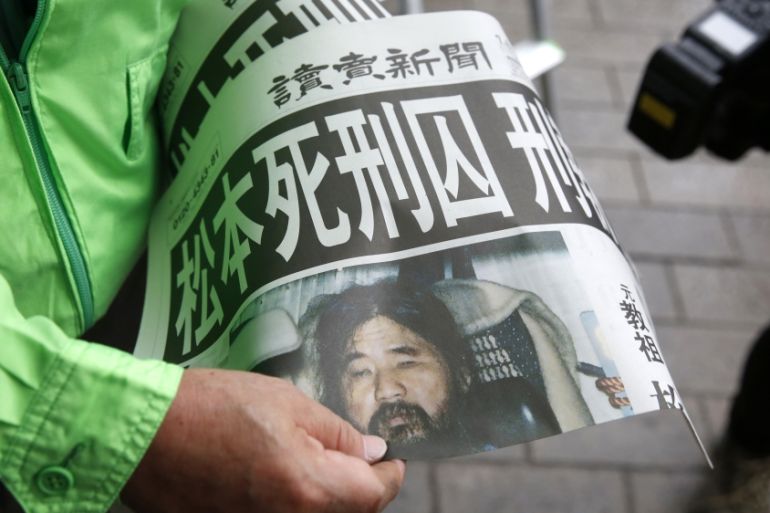Japan executes Aum Shinrikyo cult members behind Sarin attack
Aum Shinrikyo’s 1995 attack on Tokyo’s subway system killed 13 people and injured more than 6,000 others.

Japan has executed the six remaining members of doomsday cult group Aum Shinrikyo responsible for a series of crimes, including a lethal Sarin attack on the Tokyo subway in 1995, according to the country’s justice minister.
The six were executed following “careful consideration” of their involvement in the group’s crimes, which including the subway attack killed 27 people in total, Justice Minister Yoko Kamikawa told reporters at a press conference on Thursday.
Keep reading
list of 4 itemsStormy Daniels testifies during day 13 of Trump’s New York hush money trial
Key takeaways from 12th day of Trump’s New York hush-money trial
Mexicans protest and pay tribute to murdered foreign surfers
“It was [an] unprecedented level of extreme and serious crimes which must not happen again and terrified not only people in Japan but also foreign countries and shook the society,” Kamikawa said.
‘Suffering continues’
The cult’s orchestrated release of the deadly Sarin nerve agent on the Japanese capital’s subway system during the morning rush hour of March 20, 1995, killed 13 people and injured more than 6,000 others.
All 13 members of the group implicated in the attack have now been executed after Chizuo Matsumoto, the cult’s former leader who went by the name Shoko Asahara, and six other members of the group were hanged on July 6.
Shizue Takahashi, head of an association representing victim’s of the cult’s crimes, told reporters Aum Shinrikyo’s actions would continue to have “after-effects” for their victims despite the executions.
“Some bereaved families do not want to talk about the attack. Their suffering has continued. I feel very terrible,” Takahashi said.
Amnesty International, meanwhile, condemned Japan’s decision to carry out the executions, saying the “unprecedented spree” of state-sanctioned killings would “not leave Japanese society any safer”.
“The hangings fail to address why people were drawn to a charismatic guru with dangerous ideas,” Hiroka Shoji, East Asia researcher at Amnesty International, said in a statement on Thursday.
“The taking of a life in retribution is never the answer. It is high time for the Japanese authorities to establish an immediate moratorium on all executions and promote an informed debate on the death penalty as first steps towards its abolition.”
Splinter groups
Asahara founded Aum Shinrikyo, or Supreme Truth, in 1984.
By 1989 the movement had attracted a global following and, under Asahara’s leadership, amassed an arsenal of chemical, biological and conventional weapons in anticipation of an apocalyptic showdown with the government.
The organisation has since disbanded, though nearly 2,000 people follow its rituals in three splinter groups, monitored by authorities.